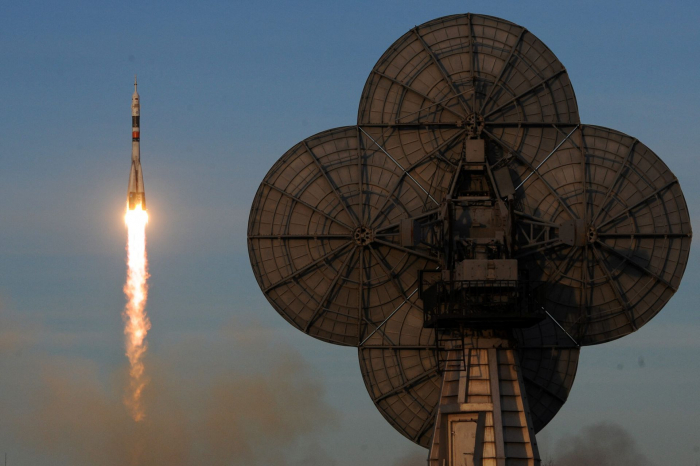by Anders Fogh Rasmussen
News that the U.S. had intelligence regarding Russian attempts to deploy nuclear capabilities in space rocked Washington D.C. last month. And though leaders in Congress and President Joe Biden’s administration were quick to temper ensuing panic, making clear that there was no imminent danger to the U.S. or its allies, the disclosure itself highlights some important facts.
The military threat in space is real, and it is growing. Furthermore, as the conflict in Ukraine shows, modern warfare is almost entirely dependent on space-based capabilities, with forces on both sides relying on satellites for communications, situational awareness and targeting enemy positions.
But this increased military reliance on space brings new threats and challenges along with it.
It’s no secret that Russia and China are investing heavily in space-based capabilities. Both have carried out well publicized anti-satellite missile tests, and Russia is known to have ground-based laser weapons designed to blind satellite sensors. Moscow has even been explicit in stating that it sees Western commercial satellites as legitimate targets in any future conflict.
However, the development of nuclear-armed anti-satellite weapons in outer space would mark a significant escalation — and it would also be in direct violation of the Outer Space Treaty of 1967, which prohibits “any objects carrying nuclear weapons or any other kinds of weapons of mass destruction” in orbit.
Moreover, as space becomes increasingly important to warfare, there is an added danger that countries lacking sophisticated space-based capabilities — such as Iran — could attempt to level the playing field in a future conflict by launching land-based missiles to hit targets in space. In such a case, satellites in the orbits closest to earth would be particularly vulnerable. And that’s not all.
A hostile actor may also attempt to destroy a handful of satellites in low-earth orbits to create a dangerous cloud of debris. Such a move would then knock out further satellites, damaging not only military capabilities but threatening all global services that rely on a satellite connection.
Western policymakers thus need to urgently adapt for these new threats.
First, we need to signal the consequences of escalation in space to Russia. If we leave space as a gray zone, it will only encourage our adversaries to test us, risking miscalculation. NATO took an important step in this regard in 2021, when leaders agreed that the Article 5 collective defense clause could be invoked by “attacks to, from, or within space.”
The next step should now be to take defensive measures, as in other domains, signaling our resolve to maintain stability in space.
Second, space needs to be treated as critical infrastructure. Activities and capabilities in space are essential to our national security as well as our economies and day-to-day lives, which is why military strategists need to work more closely with regulators and space agencies. Space is a delicate ecosystem, and any military escalation would have severe consequences for all other activities that rely on satellite connections.
Finally, we need to understand that threats to human activity in space stem not only from malign states but any actions that unduly increase the risk of space debris. NASA recognizes this, listing orbital debris as the “number one threat to spacecraft, satellites, and astronauts.” And this danger was again highlighted last month, when a U.S. research satellite narrowly avoided a Russian Electronic and Signals Intelligence satellite in low-earth orbit.
Finally, we need to understand that threats to human activity in space stem not only from malign states but any actions that unduly increase the risk of space debris | Paolo Nespoli – ESA/NASA via Getty Images
In the coming years, as the number of objects we send into space increases at an exponential rate, the risk of such collisions is set to skyrocket. In 2018, there were around 2,000 active satellites in space. That number has more than tripled, and there could be 100,000 or more active satellites by the end of the decade. This growth is driven by the launch of mega-constellations of commercial satellites by companies like SpaceX or Amazon. And the rush to populate space with so many satellites in such a short period of time brings serious risks that have yet to be properly addressed.
To this day, we lack a clear understanding of how much is too much in space. When looking at an overall threat assessment, policymakers need to understand the consequences and management of what is being put into orbit — not just the potential threat of new anti-satellite weaponry. We shouldn’t assume that putting up more satellites necessarily makes a constellation more resilient to attacks. On the contrary, doing so may well make it more fragile, leaving it vulnerable to a series of cascading collisions that could be instigated by an attack.
Space is often said to be the next geopolitical frontier. However, the reality is that it’s already the key domain for strategic competition between countries. The immediate furor in Washington over potential new Russian capabilities may have passed, but the focus on threats in space should not.
For too long, space has existed at the outer reaches of our political consciousness. And given the central role that activities in our orbits play for our economies, societies and security, this must change — urgently.
Anders Fogh Rasmussen is the founder and chairman of Rasmussen Global and is currently working pro bono with the Ukrainian President’s Office on security issues. He is former NATO secretary-general (2009-2014) and former prime minister of Denmark (2001-2009).
The original article was published on Politico.
More about:
















































